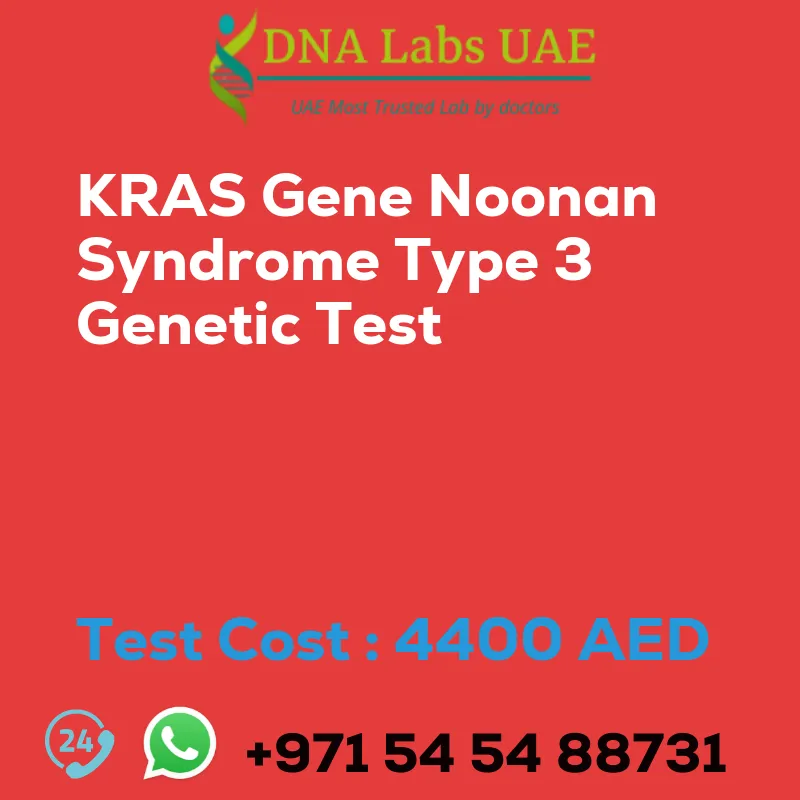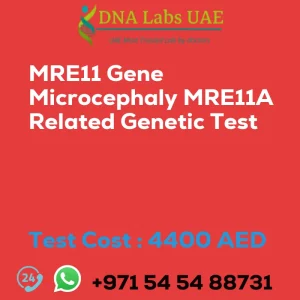KRAS Gene Noonan Syndrome Type 3 Genetic Test
Test Cost: AED 4400.0
Components
- Price: AED 4400.0
- Sample Condition: Blood or Extracted DNA or One drop Blood on FTA Card
- Report Delivery: 3 to 4 Weeks
- Method: NGS Technology
- Test Type: Dysmorphology
- Doctor: Pediatrics
- Test Department: Genetics
Pre Test Information
Clinical History of Patient who is going for KRAS Gene Noonan Syndrome Type 3 NGS Genetic DNA Test. A Genetic Counselling session to draw a pedigree chart of family members affected with KRAS Gene Noonan Syndrome Type 3 NGS Genetic DNA Test gene KRAS.
Test Details
The KRAS gene is a gene that provides instructions for making a protein called KRAS, which is involved in cell signaling pathways that control cell growth and division. Mutations in the KRAS gene can lead to the development of various genetic disorders, including Noonan syndrome type 3.
Noonan syndrome is a genetic disorder that affects many parts of the body, causing a wide range of symptoms. Noonan syndrome type 3 is specifically caused by mutations in the KRAS gene.
NGS (Next-Generation Sequencing) is a high-throughput DNA sequencing technology that can analyze multiple genes simultaneously. In the context of genetic testing for Noonan syndrome type 3, NGS can be used to identify mutations in the KRAS gene that are associated with this specific type of Noonan syndrome.
The NGS genetic test for Noonan syndrome type 3 would involve obtaining a DNA sample from the individual undergoing testing, typically through a blood sample. The DNA would then be sequenced using NGS technology to analyze the KRAS gene for any mutations.
The results of the test would indicate whether or not the individual has a mutation in the KRAS gene that is causing Noonan syndrome type 3. This type of genetic testing can be useful in diagnosing individuals with Noonan syndrome type 3, as well as providing information about the specific genetic mutation involved.
This information can be helpful for determining appropriate medical management and treatment options for individuals with this genetic disorder.
| Test Name | KRAS Gene Noonan syndrome type 3 Genetic Test |
|---|---|
| Components | |
| Price | 4400.0 AED |
| Sample Condition | Blood or Extracted DNA or One drop Blood on FTA Card |
| Report Delivery | 3 to 4 Weeks |
| Method | NGS Technology |
| Test type | Dysmorphology |
| Doctor | Pediatrics |
| Test Department: | Genetics |
| Pre Test Information | Clinical History of Patient who is going for KRAS Gene Noonan syndrome type 3 NGS Genetic DNA Test. A Genetic Counselling session to draw a pedigree chart of family members affected with KRAS Gene Noonan syndrome type 3 NGS Genetic DNA Test gene KRAS |
| Test Details |
The KRAS gene is a gene that provides instructions for making a protein called KRAS, which is involved in cell signaling pathways that control cell growth and division. Mutations in the KRAS gene can lead to the development of various genetic disorders, including Noonan syndrome type 3. Noonan syndrome is a genetic disorder that affects many parts of the body, causing a wide range of symptoms. Noonan syndrome type 3 is specifically caused by mutations in the KRAS gene. NGS (Next-Generation Sequencing) is a high-throughput DNA sequencing technology that can analyze multiple genes simultaneously. In the context of genetic testing for Noonan syndrome type 3, NGS can be used to identify mutations in the KRAS gene that are associated with this specific type of Noonan syndrome. The NGS genetic test for Noonan syndrome type 3 would involve obtaining a DNA sample from the individual undergoing testing, typically through a blood sample. The DNA would then be sequenced using NGS technology to analyze the KRAS gene for any mutations. The results of the test would indicate whether or not the individual has a mutation in the KRAS gene that is causing Noonan syndrome type 3. This type of genetic testing can be useful in diagnosing individuals with Noonan syndrome type 3, as well as providing information about the specific genetic mutation involved. This information can be helpful for determining appropriate medical management and treatment options for individuals with this genetic disorder. |








